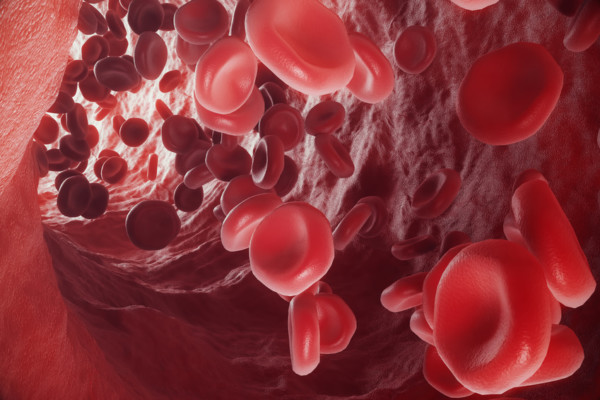What is citrulline?
Citrulline, technically termed L-citrulline, is a naturally occurring non-essential amino acid in the human body. It is one of the three dietary amino acids found in the urea cycle. The other two amino acids are arginine and ornithine1.
Roles in the body
Urea cycle
In our bodies, amino acids are broken down to form waste containing nitrogen. This waste product is called ammonia.
The urea cycle is a series of steps involving enzymes, which takes place in the liver. This cycle converts the toxic ammonia into urea, which our body is able to get rid of in urine.
Blood flow
This amino acid has another important use. It is a vasodilator, which means it dilates the blood vessels in our bodies. It does this by producing nitric oxide, which relaxes the cells around the blood vessels.
Imagine the nightmare of trying to get through a crowded train station during peak rush hour. A sea of angry commuters surrounds you. You can just about gradually squeeze yourself through a narrow channel in the crowd to get to your platform. God help you if you have luggage.
Now imagine a blissfully empty station you can run through unimpeded. You are able to take up as much space as you want to get to your destination faster and less dishevelled. Wider vessels mean more space. This is important in terms of how efficiently blood cells can deliver oxygen in times of high demand (such as exercise) and keeping a healthy blood pressure.
Dietary sources
Our bodies produce citrulline naturally, but in addition to this we can obtain more of it from our diet. The most well-known source is watermelons (which citrulline was named after, the Latin name for watermelons being Citrullus Vulgaris).
Other dietary sources include:
- pumpkins
- cucumbers
- squashes
- gourds 2
This amino acid has also become popular as a supplement useful for improving exercise and cardiovascular health.
Benefits of supplements
Exercise
In terms of exercise, citrulline supplements can help reduce fatigue and improve endurance. This is the case for both aerobic and anaerobic exercise [1].
This amino acid improves exercise endurance by increasing the uptake of oxygen by the muscles under strain3. This improved oxygen usage improves the action of the exercising muscles4, which can lead to better workouts.
Blood Pressure
Citrulline’s ability to widen blood vessels also means that it can help to lower blood pressure. This is particularly the case with people who already have high blood pressure (hypertension) or the early warning sign of high blood pressure, called prehypertension5. It can also be beneficial in heart disease, but it does not work after only one dose. It needs to be taken for longer than a week6.
Erectile Dysfunction
This amino acid can also help with the symptoms of mild to moderate erectile dysfunction. Some studies have shown that it does not work as well as the popularly known Viagra, but it is a safe alternative7.
Muscle Mass
In addition to these benefits, this amino acid can stimulate protein synthesis and reduce amino acid breakdown, which can help to maintain or increase muscle mass [4]. Some research in animals has also provided evidence that it can be useful in gastrointestinal problems including short bowel syndrome, coeliac disease, and liver disease [5]. However scientists need to conduct further research to support these findings.
Citrulline and arginine
The body converts citrulline into arginine, which it then uses to form nitric oxide (NO). Therefore, it’s no surprise that arginine supplements are also publicised for their nitric oxide boosting effects.
Interestingly, it has been found that it is more effective to take citrulline supplements than arginine for this effect. This is because arginine supplements cause a sudden spike of arginine in the body, whereas the effect of citrulline is more gradual and leads to a longer lasting increase in the arginine levels [1].
Furthermore, the gut does not absorb L-arginine supplements well. Therefore it is better to take L-citrulline supplements which will then be turned into L- arginine by your kidneys for better use by the body8.
Citrulline malate
You might have noticed that citrulline supplements come in two forms: citrulline and citrulline malate. Citrulline malate is L-citrulline with an attached malate molecule. The malate is important in energy production. In general, citrulline malate is more common in sports supplements and some studies have shown it to improve performance in tennis and weight lifting9,10.
Overall, many people prefer citrulline malate, because the addition of malate improves exercise performance. In addition to this, L-citrulline by itself must be “pre-loaded” and taken for a week before exercise in order to benefit from it.
However, citrulline malate can be taken an hour before exercise and it is still effective11.
Dosage
The recommended dosage of supplements varies according to your reason for taking it.
For circulatory health or to help with erectile dysfunction, you should take 1000 mg of citrulline (1g) 3 times per day with meals so that your total daily dose is 3000mg (3g). However, you don’t need to take this amino acid with food, unlike other supplements.
If you would rather use citrulline malate, you will need to convert the dosage and take 1.76g of citrulline malate for every 1g of citrulline that you would usually take. To improve your exercise performance, you should take 6000-8000mg (6-8g) of citrulline malate around an hour before you exercise.
Safety
This amino acid is safe to take and it does not cause any side effects in recommended doses. However you should not take these supplements if you are already taking nitrates for heart disease, any blood pressure medications or erectile dysfunction drugs including Viagra, Cialis or Levitra.
This is because the combination of L-citrulline and these medicines can result in a severe drop in your blood pressure. You also should not take this amino acid if you are pregnant or breastfeeding [5]. If you are unsure if citrulline is right for you then it is best to discuss this with your doctor.
Sources
- Examine.com. Citrulline. 2017 ↩
- Kaore SN, Amane HS, Kaore NM. Citrulline: pharmacological perspectives and its role as an emerging biomarker in future. Fundamental and Clinical Pharmacology, Internet. 2013 ↩
- Bailey SJ, Blackwell JR, Lord T, Vanhatalo A, Winyard PG, Jones AM. L-Citrulline supplementation improves O2 uptake kinetics and high-intensity exercise performance in humans. Journal of Applied Physiology. 2015. 119(4):385-395. Available from: https://www.ncbi.nlm.nih.gov/pubmed/26023227 ↩
- Healthline. Should You Take Citrulline Supplements? 2017 ↩
- Web MD. L-citrulline Uses and Risks. 2017 ↩
- Morita M, Sakurada M, Watanabe F, Yamasaki T, Doi H, Ezaki H, Morishita K, Miyakex T. Effects of Oral L-Citrulline Supplementation on Lipoprotein Oxidation and Endothelial Dysfunction in Humans with Vasospastic Angina. Immunology, Endocrine and Metabolic Agents in Medicinal Chemistry. 2013. 13(3):214-220. Available from: https://www.ncbi.nlm.nih.gov/pubmed/26005507 ↩
- Cormio L, De Siati M, Lorusso F, Selvaggio O, Mirabella L, Sanguedolce F, Carrieri G. Oral L-citrulline supplementation improves erection hardness in men with mild erectile dysfunction. Urology. 2011. 77(1):119-122. Available from: https://www.ncbi.nlm.nih.gov/pubmed/21195829 ↩
- Examine.com. Arginine ↩
- Glenn JM, Gray M, Jensen A, Stone MS, Vincenzo JL. Acute citrulline-malate supplementation improves maximal strength and anaerobic power in female, masters athletes tennis players. European Journal of Sport Science. 2016. 16(8):1095-1103. Available from: https://www.ncbi.nlm.nih.gov/pubmed/27017895 ↩
- Wax B, Kavazis AN, Weldon K, Sperlak J. Effects of supplemental citrulline malate ingestion during repeated bouts of lower-body exercise in advanced weightlifters. Journal of Strength and Conditioning Research. 2015. 29(3):786-792. Available from: https://www.ncbi.nlm.nih.gov/pubmed/25226311 ↩
- Bodybuilding.com. L-Citrulline or Citrulline Malate? N.O. Contest! 2017 ↩









